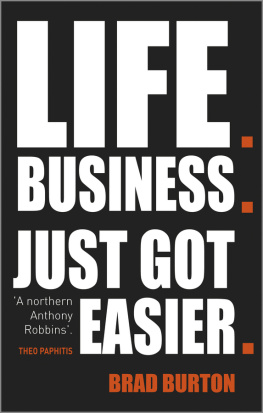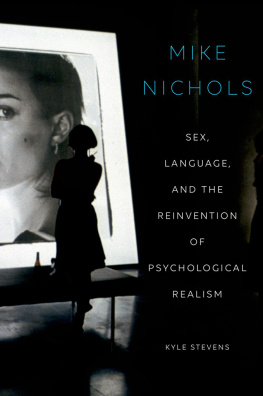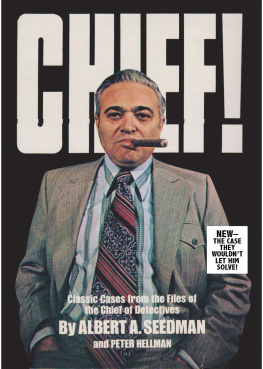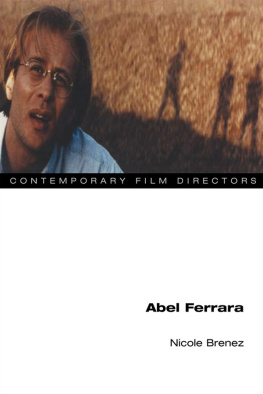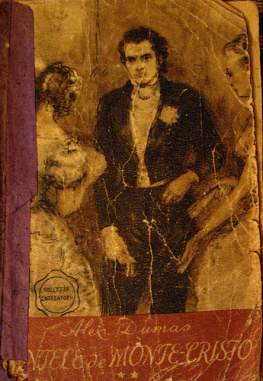Brad Stevens - Monte Hellman: His Life and Films
Here you can read online Brad Stevens - Monte Hellman: His Life and Films full text of the book (entire story) in english for free. Download pdf and epub, get meaning, cover and reviews about this ebook. year: 0101, publisher: McFarland & Company, genre: History. Description of the work, (preface) as well as reviews are available. Best literature library LitArk.com created for fans of good reading and offers a wide selection of genres:
Romance novel
Science fiction
Adventure
Detective
Science
History
Home and family
Prose
Art
Politics
Computer
Non-fiction
Religion
Business
Children
Humor
Choose a favorite category and find really read worthwhile books. Enjoy immersion in the world of imagination, feel the emotions of the characters or learn something new for yourself, make an fascinating discovery.

- Book:Monte Hellman: His Life and Films
- Author:
- Publisher:McFarland & Company
- Genre:
- Year:0101
- Rating:5 / 5
- Favourites:Add to favourites
- Your mark:
- 100
- 1
- 2
- 3
- 4
- 5
Monte Hellman: His Life and Films: summary, description and annotation
We offer to read an annotation, description, summary or preface (depends on what the author of the book "Monte Hellman: His Life and Films" wrote himself). If you haven't found the necessary information about the book — write in the comments, we will try to find it.
Monte Hellman: His Life and Films — read online for free the complete book (whole text) full work
Below is the text of the book, divided by pages. System saving the place of the last page read, allows you to conveniently read the book "Monte Hellman: His Life and Films" online for free, without having to search again every time where you left off. Put a bookmark, and you can go to the page where you finished reading at any time.
Font size:
Interval:
Bookmark:

Monte Hellman

Monte Hellman
HisLifeandFilms
BRAD STEVENS
foreword by Monte Hellman

McFarland & Company, Inc., Publishers
Jefferson,NorthCarolina,andLondon
Frontispiece: Drawing of Monte Hellman made by Joe Sison, one of the actors in BackDoortoHell.
Library of Congress Cataloguing-in-Publication Data
Stevens, Brad, 1967-
Monte Hellman : his life and films/
Brad Stevens; foreword by Monte Hellman.
p. cm.
Includes [bibliographical references, filmography and] index.
ISBN 0-7864-1434-0 (softcover : 50# alkaline paper)
1. Hellman, Monte, 1932-
2. Motion picture producers and directors United States Biography.
3. Theatrical producers and directors United States Biography.
I. Title.
PN1998.3.H453 S74 2003 791.43'0233'092dc21 2002154294
British Library cataloguing data are available
2003 Brad Stevens. All rights reserved
Onthefrontcover: Monte Hellman directing Two-LaneBlacktop (1971)
Manufactured in the United States of America
McFarland&Company,Inc.,Publishers
Box611,Jefferson,NorthCarolina28640
www.mcfarlandpub.com
To the memory of my father, Irving Stevens (1939-2000)
Acknowledgments
I would like to express my sincere thanks to the following: Lindsey Annison, Ed Begley, Jr., Nicole Brenez, Francis Brewster, John Charles, Jon Davison, Charles Eastman, Ernest Farino, Howard Fridkin, Steven Gaydos, Julian Grainger, Robert Guest, David Hess, Jack Hill, Carl Hose, Neil Jackson, Kent Jones, Paul Joyce, Stanton Kaye, Bill Krohn, Gary Kurtz, Charles Lindsay, Tim Lucas, Adrian Martin, Marc Morris, Bill Moseley, Sam Moyer, Alberto Pezzotta, Laurie Post, Frederick Rappaport, Jonathan Rosenbaum, John Ulrich, Rebecca and Sam Umland, Daniel Walsh, Mark Wickum and Vernon Zimmerman.
Special thanks go to Monte Hellman for his endless patience, constant willingness to answer even my most pedantic questions, and thorough proof-reading/fact-checking of the manuscript (regardless of which all errors remain my own): it may sound like a clich, but this book would not have been possible without him.
Foreword
The idea of a frame-by-frame analysis of my movies initially struck me with horror. First of all, I had been taught by Roger Corman that no frame in a film was indispensable. And second, it seemed eerie to have someone (and possibly many people) looking at my pictures more carefully than I ever had myself. Not that I had been cavalier or hadn't taken great pains. Well, maybe I had been cavalier, but still I had taken great pains. But my way of working had been much more emotional and instinctual than analytical or mathematical.
So I was pleasantly surprised to read Brad Stevens' book and find I wasn't bored. Of course the subject matter had a unique interest for me. It's a little like the actor talking about how his performance had gone, and finally apologizing with, "But enough about me; what did you think of my performance?" It's hard to resist someone talking about you.
But beyond the ego satisfaction, I had a great trip, reliving many pleasant, as well as unpleasant, experiences. And, best of all, I found that many times the analyses of the films mirrored my own intentions, even if I had never expressed them in such a concrete or detailed way.
Brad and I have never met, but between us we have exchanged nearly five hundred e-mails over a period of a year-and-a-half. He constantly pressed me to remember, to paraphrase Borges, unforgettable events now forgotten. I, in turn, enlisted the help of friends and co-workers to try to pin down names and dates.
The result is the history of a career that now seems strange to me. But it didn't seem strange while I was experiencing it. I merely continued to pursue projects that interested me, at the same time taking whatever work came my way.
These days, the interesting projects seem to outnumber the whatevers. In any case, I'm continuing along the same path the only one I know.
MonteHellman
November19, 2001
Introduction
Before World War I, Eisenstein and Griffith made completely different films, even though Eisenstein learned from Griffith. And Murnau in Germany and Chaplin in Hollywood they all made different films. But it was all cinema. Whereas the Eisensteins, Chaplins and Murnaus of today are kept from doing films by people who demand a single universal cinema which is a dead cinema.
Jean-Luc Godard in
TwoAmericanAudiences (1968)
The history of the cinema is a long martyrology.
Gilles Deleuze, Cinma1,l'Image-Movement (1983)
In 1970, a LosAngelesTimes headline described Monte Hellman as "Hollywood's Best Kept Secret." Three decades later, nothing has changed. One of our greatest filmmakers still inhabits a twilight world, his genius recognized only by a few admirers who meet furtively in dark alleyways to exchange fourth generation dubs of BackDoortoHell.
Although this book's purpose is to honor Monte Hellman, it should be stressed at the outset that Hellman is only one (though certainly among the most important) of America's marginalized filmmakers: Erich von Stroheim, Orson Welles, Albert Lewin, Nicholas Ray, John Cassavetes, Elaine May, Charles Eastman, Stanton Kaye, Sam Peckinpah, Donald Cammell, Michael Cimino, Abel Ferrara, and so on. Many of these directors were Hellman's collaborators, and all of them were (to greater or lesser degrees) victims of those financial institutions which theoretically exist to enable the production of films, but actually create obstacles for artists who refuse to conform with the dominant ideology. As Gilles Deleuze has pointed out, the great filmmakers are far more vulnerable than painters, writers, musicians and thinkers of similar stature, since "it is infinitely easier to prevent them from doing their work."1
It is not my intention to suggest that this problem is uniquely American (Dreyer, Tati and Vigo encountered similar opposition), nor to imply that the products of America's commercial cinema are worthless. On the contrary, many of the twentieth century's greatest artistsHawks, Ford, Hitchcock, Capra flourished under this system. But the enormous gaps which punctuate Monte Hellman's career testify as eloquently as anything in the films themselves to a culture in a state of crisis, a culture both overwhelmingly powerful and neurotically insecure, monolithic and yet riven by cracks and contradictions, a culture built upon principles of free speech, yet singlemindedly dedicated to silencing voices of dissent. For this reason, my focus in the pages that follow will be as much on the "gaps" the unmade projects, the anonymous piecework as on the primary texts. Indeed, the collected output of those above-named mavericks itself functions as a kind of gap, a suppressed tradition existing in the margins of our "official" discourses.
Next pageFont size:
Interval:
Bookmark:
Similar books «Monte Hellman: His Life and Films»
Look at similar books to Monte Hellman: His Life and Films. We have selected literature similar in name and meaning in the hope of providing readers with more options to find new, interesting, not yet read works.
Discussion, reviews of the book Monte Hellman: His Life and Films and just readers' own opinions. Leave your comments, write what you think about the work, its meaning or the main characters. Specify what exactly you liked and what you didn't like, and why you think so.

